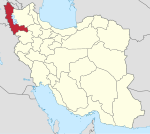Haftevan
Haftevan
Persian: هفتوان | |
|---|---|
Village | |
 St. George Church, a 13th century Armenian church | |
| Coordinates: 38°10′03″N 44°45′19″E / 38.16750°N 44.75528°E[1] | |
| Country | Iran |
| Province | West Azerbaijan |
| County | Salmas |
| District | Central |
| Rural District | Zulachay |
| Population (2016)[2] | |
• Total | 8,203 |
| Time zone | UTC+3:30 (IRST) |
Haftevan[3] (Persian: هفتوان)[a] is a village in Zulachay Rural District of the Central District of Salmas County, West Azerbaijan province, Iran.
History
[edit]In early 1915, the village was occupied by the Ottoman Army, who required local Christians to register for food rations. Instead, 700 family heads were executed in the village on the orders of Djevdet Bey. Russian Army commander K. Matikyan reported seeing "with my own eyes hundreds of mangled corpses in pits, stinking from infection, lying in the open. I saw headless corpses, chopped off by axes, hands, legs, piles of heads, corpses crushed under rocks from fallen walls". According to historian David Gaunt, "This was where the Ottoman soldiers learned to execute unarmed noncombatant Christians", leading to the Armenian genocide and Assyrian genocide.[3]
Demographics
[edit]Ethnicity
[edit]In 1930, the village was populated by Armenians, Azerbaijanis and Kurds.[5]
Population
[edit]At the time of the 2006 National Census, the village's population was 6,313 in 1,216 households.[6] The following census in 2011 counted 7,995 people in 1,796 households.[7] The 2016 census measured the population of the village as 8,203 people in 1,935 households. It was the most populous village in its rural district.[2]
See also
[edit]Notes
[edit]References
[edit]- ^ OpenStreetMap contributors (27 September 2024). "Haftevan, Salmas County" (Map). OpenStreetMap (in Persian). Retrieved 27 September 2024.
- ^ a b Census of the Islamic Republic of Iran, 1395 (2016): West Azerbaijan Province. amar.org.ir (Report) (in Persian). The Statistical Center of Iran. Archived from the original (Excel) on 30 August 2022. Retrieved 19 December 2022.
- ^ a b Gaunt, David (2020). "When Perpetual Persecution Becomes Ottoman Genocide". Bustan: The Middle East Book Review. 11 (1): 1–19. doi:10.5325/bustan.11.1.0001. ISSN 1878-5301. JSTOR 10.5325/bustan.11.1.0001.
- ^ Haftvan can be found at GEOnet Names Server, at this link, by opening the Advanced Search box, entering "-3767370" in the "Unique Feature Id" form, and clicking on "Search Database".)
- ^ J. S., Chalenko; Berberian, M. (1974). "The Salmas (Iran) earthquake of May 6th, 1930". Annals of Geophysics. 27 (1–2): 162–163. doi:10.4401/AG-4919. S2CID 127985780.
- ^ Census of the Islamic Republic of Iran, 1385 (2006): West Azerbaijan Province. amar.org.ir (Report) (in Persian). The Statistical Center of Iran. Archived from the original (Excel) on 20 September 2011. Retrieved 25 September 2022.
- ^ Census of the Islamic Republic of Iran, 1390 (2011): West Azerbaijan Province. irandataportal.syr.edu (Report) (in Persian). The Statistical Center of Iran. Archived from the original (Excel) on 20 January 2023. Retrieved 19 December 2022 – via Iran Data Portal, Syracuse University.


